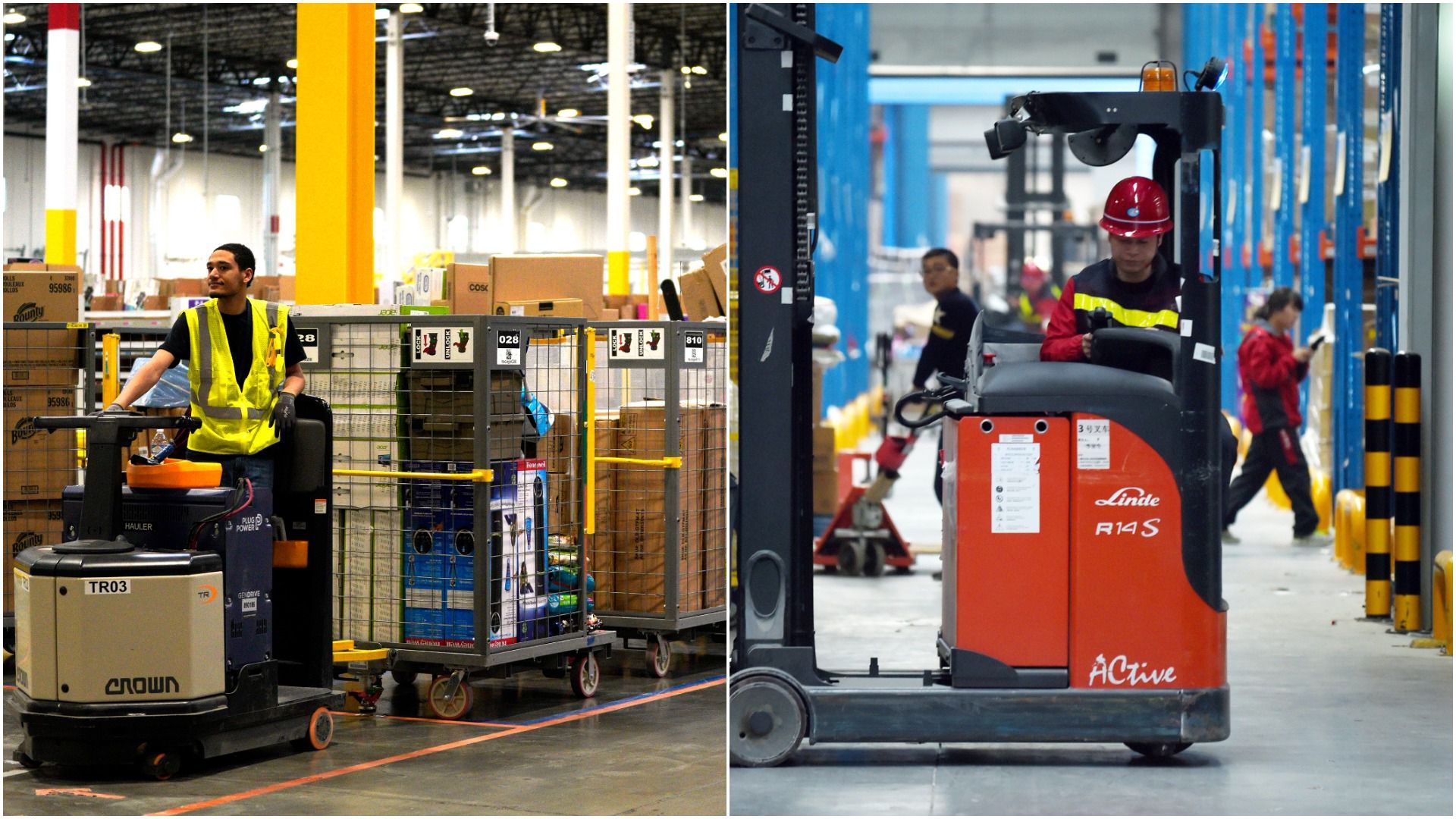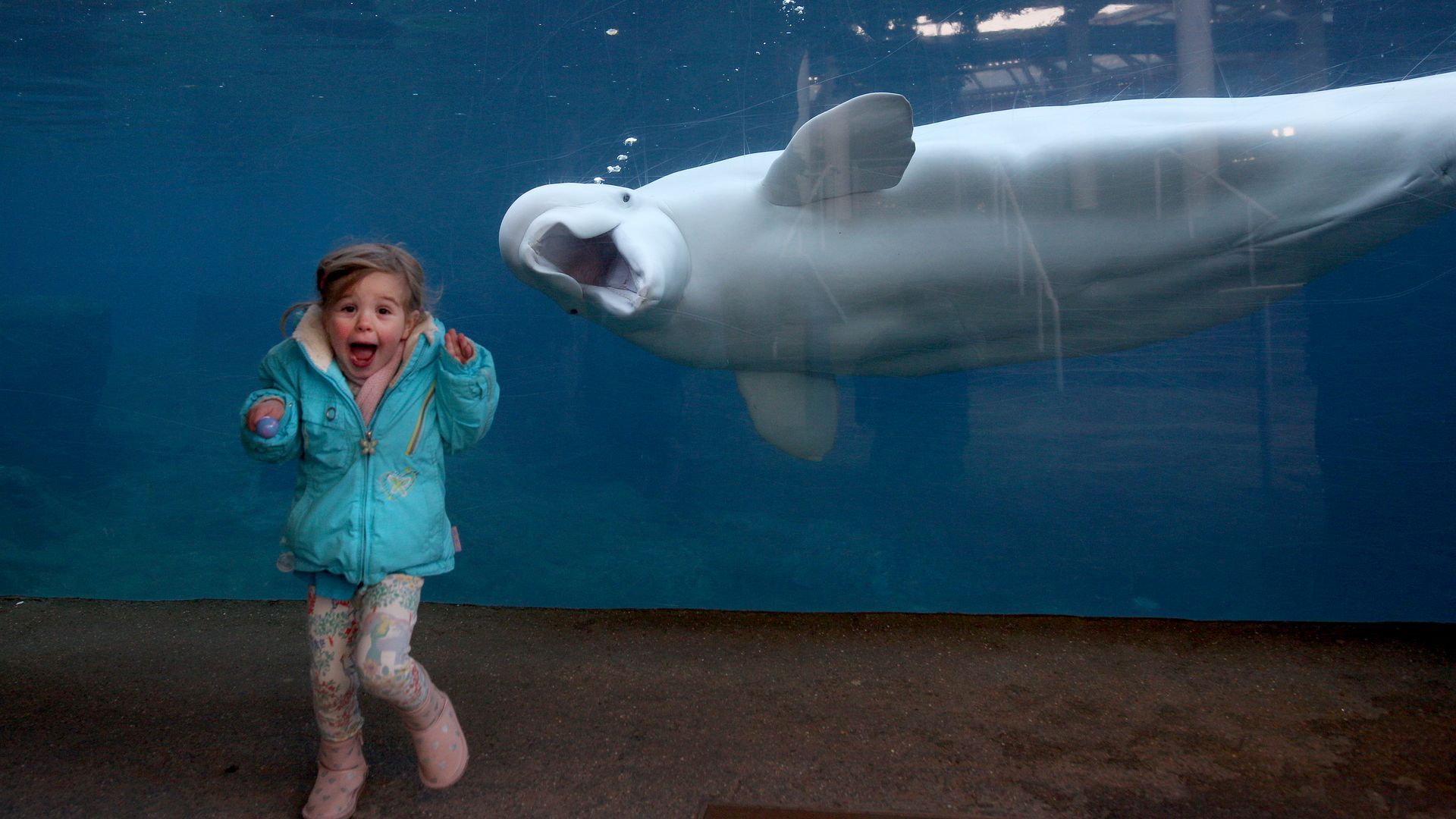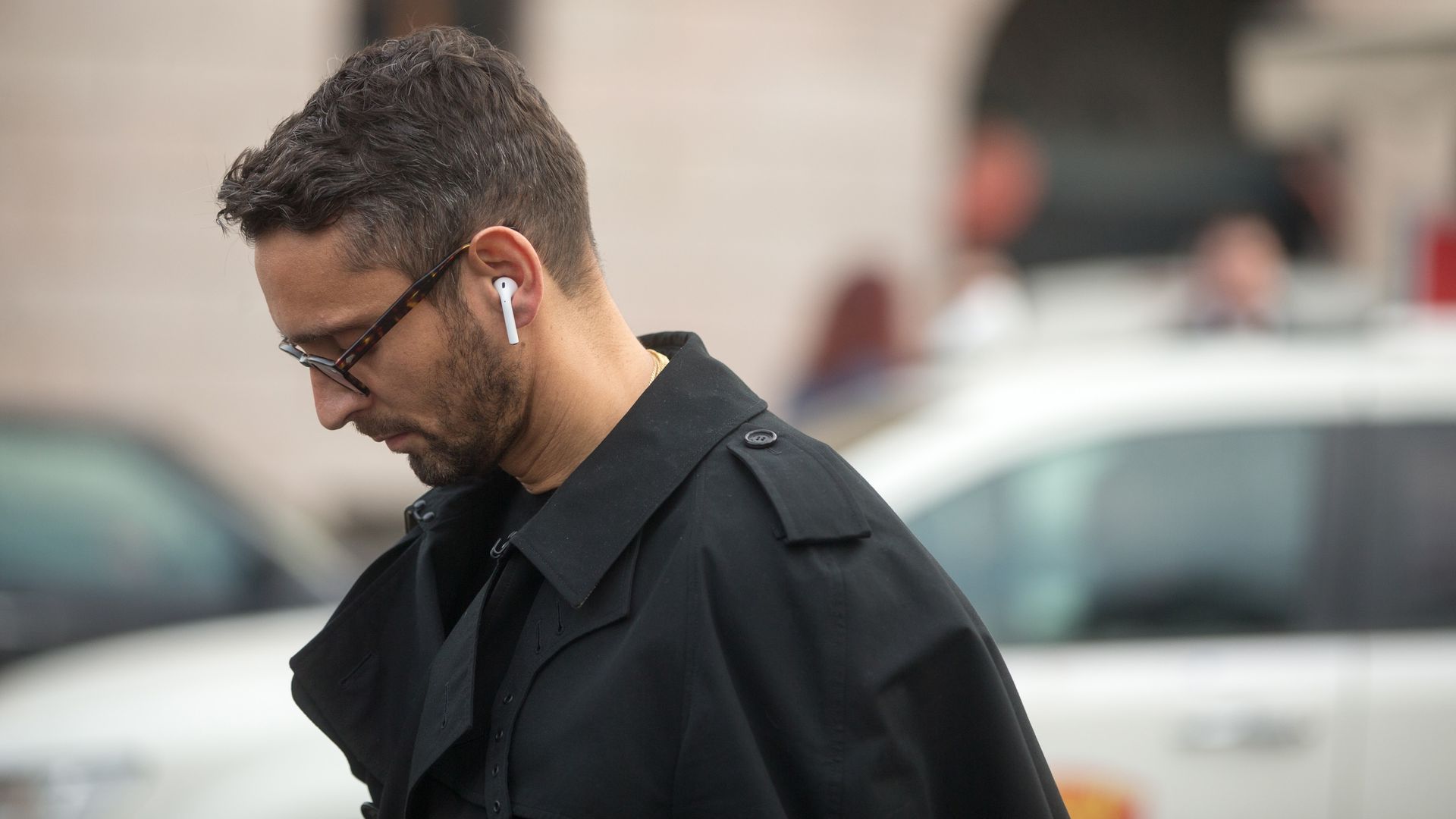April 26, 2019
Have your friends signed up?
Any stories we should be chasing? Hit reply to this email or message me at [email protected]. Kaveh Waddell is at [email protected] and Erica Pandey at [email protected].
Okay, let's start with ...
1 big thing: Facebook's fateful question

Illustration: Sarah Grillo/Axios
At a time bigness is being broadly equated with badness, no one is perhaps more so equated than Facebook, the dominant global force in online friendship and the target of a relentless drumbeat of new probes into how it governs itself.
But there may be good news of sorts for the company — that its critics by and large don't seem any worse inclined toward it than last summer and fall, amid a flood of new reports of data breaches. Some continue to call for it to be broken up, while others say that they are still not certain what should be done.
- What's happening: As Axios reported, Facebook yesterday was hit with a trio of new probes from regulators in Ireland, Canada and New York, all looking into how it handles data, its main source of revenue.
- In addition, Facebook said this week that it expects to be fined $3 billion to $5 billion by the Federal Trade Commission, and the NYT reports the agency is considering restraints on the platform's business practices.
- There are some political headwinds, too: Last month, Democratic Sen. Elizabeth Warren said that, if elected, she will move to break up Facebook, in addition to Amazon and Google.
Yet, none of this has appeared to faze investors: Facebook shares were down by about 0.9% today but up 7% for the week. They have surged a whopping 41% for the year.
Against the backdrop of these conflicting signals, I queried experts last August on the pluses and minuses of simply making the platform disappear.
Back then, Ian Bremmer, president of the Eurasia Group, found much geopolitically and financially to dislike about the idea. Among the downsides of Facebook abruptly vanishing would be "value destruction for shareholders, job losses, negative impact on economy. Ceding social media battle globally to China-driven monopolies," such as Tencent.
- Queried again this week, Bremmer said his mind had not changed — "the social media problems inside western democracies have become even more toxic, while the competition with Chinese state-led and funded companies is becoming a bigger challenge."
- Yet, in fact Bremmer had moved a bit: "It’s getting much harder to argue that Facebook is providing a social good," he told me.
- Still, he reckoned that, all in all, there was no way at the moment to say whether Facebook should break up. "Question is how much do you value money as opposed to personal sanity."
Then as now, some are less squeamish about Facebook's disappearance. Nicholas Wright, a British neurologist who studies artificial intelligence and politics, back then talked up a world without Facebook — as long as it was done without a government hand.
- Chatting again this week, Wright said nothing about terrible blows. "Facebook is an overweening communication utility that abuses its market power, whose replacement with a more competitive ecosystem of separate social media providers would benefit the U.S. economy and society," he said.
- Yet, he said, there is a way to redeem the platform. "Facebook's problems are eminently reformable with political will. But without reform, it's bad for U.S. society and U.S. power abroad."
So far, Facebook was faring neither better nor worse.
Among the next I queried was Tim Wu, a professor at Columbia and author of The Curse of Bigness. I had spoken with Wu in October, when he called for a legal review of some 70 company acquisitions by Facebook, especially of Instagram and WhatsApp, and urged the company's breakup.
The cascade of new disclosures just make Wu say the same thing: "It is crazy to have one firm owning these three major social media empires, and thereby eliminating any hope of real competition between them."
In a statement, Facebook said:
We operate in a fiercely competitive market where for every service offered on Facebook and our family of apps, you can find at least three or four competing services with hundreds of millions, if not billions, of users. Importantly, the core of antitrust law is centered on doing what is best for consumers — lower prices, higher quality, better products and services, and more innovation. That is exactly where we are focused — building the best products and services for consumers and advertisers across our family of apps.
2. Amazon's starts a delivery war

An Amazon warehouse (left); a JD warehouse (right). Photos: Rick T. Wilking/Getty; Wang Zhao/AFP/Getty
Amazon's move to slash delivery times in half for Prime members — from 2 days to 1 — will squeeze American retailers, who are already scrambling to match it. But the e-commerce behemoth is still miles behind its Chinese rivals.
Erica writes: As we reported from China last summer, JD.com is already delivering 90% of its packages within 24 hours. Even 85% of packages shipped from abroad get to customers' doorsteps in a day. Last year, Alibaba said it will offer same-day delivery to all of China. Amazon is just catching up.
The backdrop: Part of why JD.com has been able to offer fast shipping is its logistics network — unlike anyone else in China, it controls the whole delivery process from warehouse to front door, across the country, relying on no other companies. Amazon continues to lean on UPS and the USPS, in addition to its own vans and trucks.
- What's next: Look for Amazon to significantly build out its own fleet, says Griffin Carlborg, an analyst with Gartner L2.
The big picture: In the U.S., "no one can match Amazon right now," Carlborg says.
- It has money to spend: The company said it will lay out an immediate $800 million on added trucks, warehouses and employees — and it expects to keep spending more.
- It has millions more products: While Walmart and Target, Amazon's top U.S. competitors, also offer fast shipping, their inventory eligible for quick delivery comes nowhere close to Amazon's 100 million available products, says Carlborg.
And Amazon's ambitions are bigger than what the Chinese companies have announced so far.
- CFO Brian Olsavsky told analysts yesterday Amazon expects to take 1-day shipping to all of its international markets, including Brazil, China and India. For now, China's speed shipping is primarily a domestic offering.
- Worth noting: JD.com is aiming to offer same-day shipping for 85% of products in Indonesia, its next-biggest market. Flipkart, Amazon's chief rival in India, has same-day delivery in 10 cities.
Bonus: Mailbox

Photo: Corbis/Getty
We've had a busy to-and-fro with readers this week. Here are a few items:
- On yesterday's look at the challenge to the legacy of icon economist Milton Friedman:
In the 25 years before Friedman's NYT essay, most corporate leaders would have described their role as balancing the interests of all of their stakeholders — their shareholders, yes, but also their employees, customers, the communities they operated in and society as a whole. As late as 1990, the Business Roundtable — made up of America's top CEOs — affirmed that "the thrust of history and law strongly supports the broader view of the directors’ responsibility to carefully weigh the interests of all stakeholders.”
But in 1997, the Roundtable (reflecting the change in norms across corporate America) started singing a different tune: Suddenly, it declared that "the paramount duty of management and of boards of directors is to the corporation’s stockholders; the interests of other stakeholders are relevant as a derivative of the duty to stockholders.”
Today, a number of organizations — including the Aspen Institute's Business and Society Program, the Coalition for Inclusive Capitalism and the Drucker Institute (where my colleagues and I have created corporate rankings and a new financial index with S&P that are built on a holistic, stakeholder-oriented model) — are pushing for companies to put an end to shareholder primacy. What we're asking for isn't new and radical, however. It would simply mark a shift back to where things used to be, better serving society and ultimately capitalism itself.— Rick Wartzman, Los Angeles
Apropos of our Aug. 10 look at "so-so automation," a new thesis by MIT economist Daron Acemoglu, we received the following phone call:
We have owned 3 Honda Odysseys since 2012. Now we own a 2017. It's our first 'smart' one. It has sensors on the side that beep if you are too close to another car. It also has an automatic braking function that flashes orange if it senses something ahead. But if you don't brake, it brakes for you.
My wife discovered that fact the other day. The light started flashing orange. There was some car way ahead making a left turn. Josie saw it. There was no problem. So she ignored it. Then the car slammed on the brakes in the middle of the road. It scared the daylights out of her. So now we turn off that function every time we get into the car.
We are living in an age of awkward AI. It probably passes a lot of tests, but it isn't A+ AI, and we need A+ AI. We are in for some time of bad AI beta testing in the world, and we are all going to be the guinea pigs for that.— Chris Leonard, Washington, D.C.
- On Erica's story Wednesday on the reality of being a superstar tech hub:
I grew up in Mountain View — or Googlandia, as my sister calls it — in the 1980s and 1990s and the city I once knew hasn't existed for a long time. The house I grew up in literally doesn't exist. It was torn down several years ago in favor of a pushing-the-edges-of-zoning-restrictions house in its place. I came out to D.C. for college and never made it back. None of my family live in MV anymore and neither do any friends I keep up with from high school. Unsurprisingly, the only people I know who are still there work in tech or live in places they or their family have owned for a long time.— Liz Farmer, Washington, D.C.
3. What you may have missed

Photo: Tim Clayton/Corbis/Getty
Our attention can get diverted. Never mind, here is the top of the week at Future:
1. Tech devices to stave off date rape: Detecting roofies
2. Jobs of the future cool: Even they are subject to physics
3. Being a superstar hub can suck: Including the loss of your soul
4. Going after Milton Friedman: A challenge to the economist icon
4. Worthy of your time
/2019/04/26/1556290522522.gif?w=1920)
Illustration: Aïda Amer/Axios
The peril of advising authoritarians (Calvert Jones - Foreign Affairs)
Global economic whiplash (Dion Rabouin - Axios)
The story that ended Truman Capote's career (Esquire) (h/t Elaine Moore)
Can Uber ever be profitable? (The Economist)
Warren Buffet's heck-of-a-time (Robert Armstrong, Eric Platt, Oliver Ralph - FT)
5. 1 fun thing: The great AirPods backlash

Milan Fashion Week 2017. Photo: Melodie Jeng/Getty
First they laughed. Then they bought them. And then they were laughed at.
Kaveh writes: This is the saga of the AirPods, Apple's ubiquitous wire-free earbuds. After initial ridicule, they sold like wireless hotcakes. Now comes the backlash.
- In a BuzzFeed story last week, Alex Kantrowitz reported on the "AirPods Barrier," an invisible bubble around humans who has plugged their ears with the $159 gadgets.
- “It’s kind of a reminder of how people view service workers," one barista told Kantrowitz. "I think there’s a good percentage of people who don’t see me as a full person.”
But despite being the butt of endless memed derision, AirPods are going strong. Only once has Apple sold more of a new product its first 2 years, according to one analysis, and that was the iPad.
Bonus: There's a lot of ways to describe the weird snipped-the-wires look of the AirPod. But none approach how WSJ Men's Fashion Editor Jacob Gallagher put it in a February column: "crystallized globs of sweat that dangle from each ear."